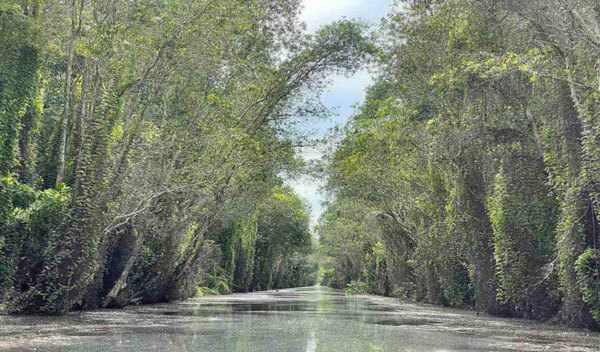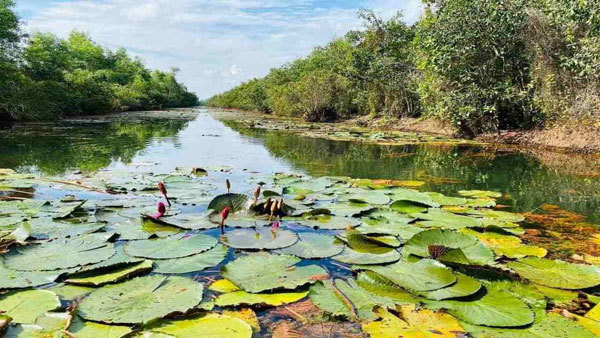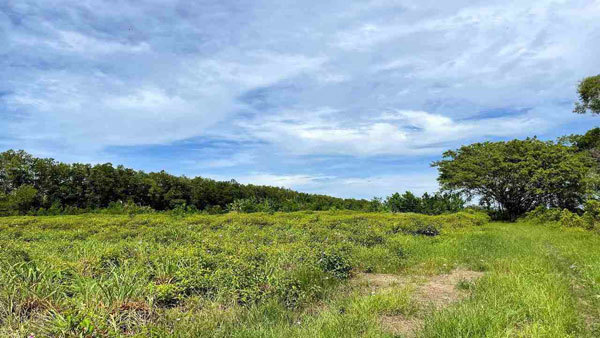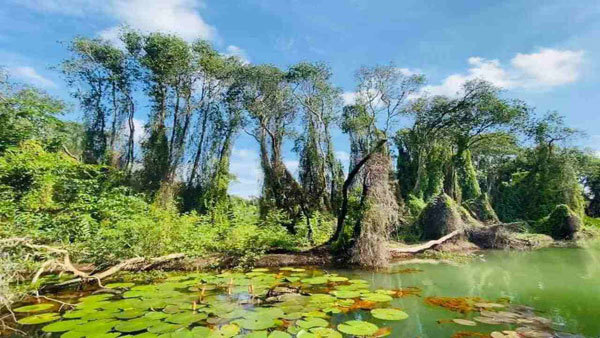A trip to the Dong Thap Muoi Center for Medicinal Plant Preservation in Long An Province allows travelers to explore Dong Thap Muoi, arguably the most famed inland wetland in the Mekong Delta, and watch before their eyes and touch natural medicinal herbs. They can also plant vegetables and prepare their own medicines on the spot before taking them home.
 |
| A canal inside the Dong Thap Muoi Center for Medicinal Plant Preservation. |
Not very far from HCMC, about 100 kilometers from Saigon’s center, the Dong Thap Muoi Center for Medicinal Plant Preservation in Moc Hoa District, Long An Province, is home to vast forests of tram gio, whose English name is broad-leaved paperbark, or paper bark tea tree (Melaleuca quinquenervia), and many other strains of popular medicinal herbs in Vietnam, especially in the south, such as la cach (Premna serratifolia), ma de (broadleaf plantain or white man’s foot – Plantago major), trai nhau (Noni fruit – Morinda citrifolia), and many more.
 |
| Water plants are plentiful at the center. |
The establishment of this center is closely associated with a man named Ba Phen, who was said to have abandoned his urban life to reclaim this area of swampland and turned it into a center where natural medicinal herbs are grown and preserved.
The center is where travelers can explore Dong Thap Muoi, which is said to be the most exciting inland wetland in the Mekong Delta, and arrange photo sessions with natural and waterway settings, or watch before their eyes and touch natural medicinal herbs. They can also plant vegetables on the spot.
 |
| A swathe of grassland in Dong Thap Muoi Center for Medicinal Plant Preservation. |
According to Bui Dac Thang, director of the center, his site is home to around 1,000 hectares of melaleuca, mostly paperbark trees, which are a great source of natural pharmaceuticals.
Aside from several imported malaleuca species, Dong Thap Muoi Center for Medicinal Plant Preservation has helped retain more than 90 rare strains of medicinal herbs.
After a tour of the center’s medicinal plant forests, guests are scheduled to visit Moc Hoa Tram, its medicine production factory, where 30 different medicines are produced from all natural ingredients. At the factory, visitors can choose some medicines on display for their own or to be used as gifts for their loved ones or friends. They are also instructed to prepare some simple medicines which can be taken home.
In addition, outdoor activities are available, which are distinctive of the Mekong Delta where waterway transport dominates the people’s daily life, such as going fishing or spreading fishing nets. Meanwhile, a boat tour to paperbark forests allows travelers to snake their way through water flowers and at the same time make the most of the fresh and unpolluted atmosphere.
A place of interest in the itinerary is the movie studio where the famous film Canh dong bat tan (The Endless Field) was once shot. On site are thatched-roof huts, wooden shaky bridges and lotus ponds reminiscent of the scenes in the film.
 |
| A local scene. |
In addition, visitors may relax by taking time out for a foot bath soaked in medicinal substances or enjoy dishes beneficial to their health as they are prepared with medicinal herbs besides other ordinary ingredients.
Such a trip to Dong Thap Muoi Center for Medicinal Plant Preservation in Long An Province is a way to shorten the distance between humans and nature.
Source: SGT



